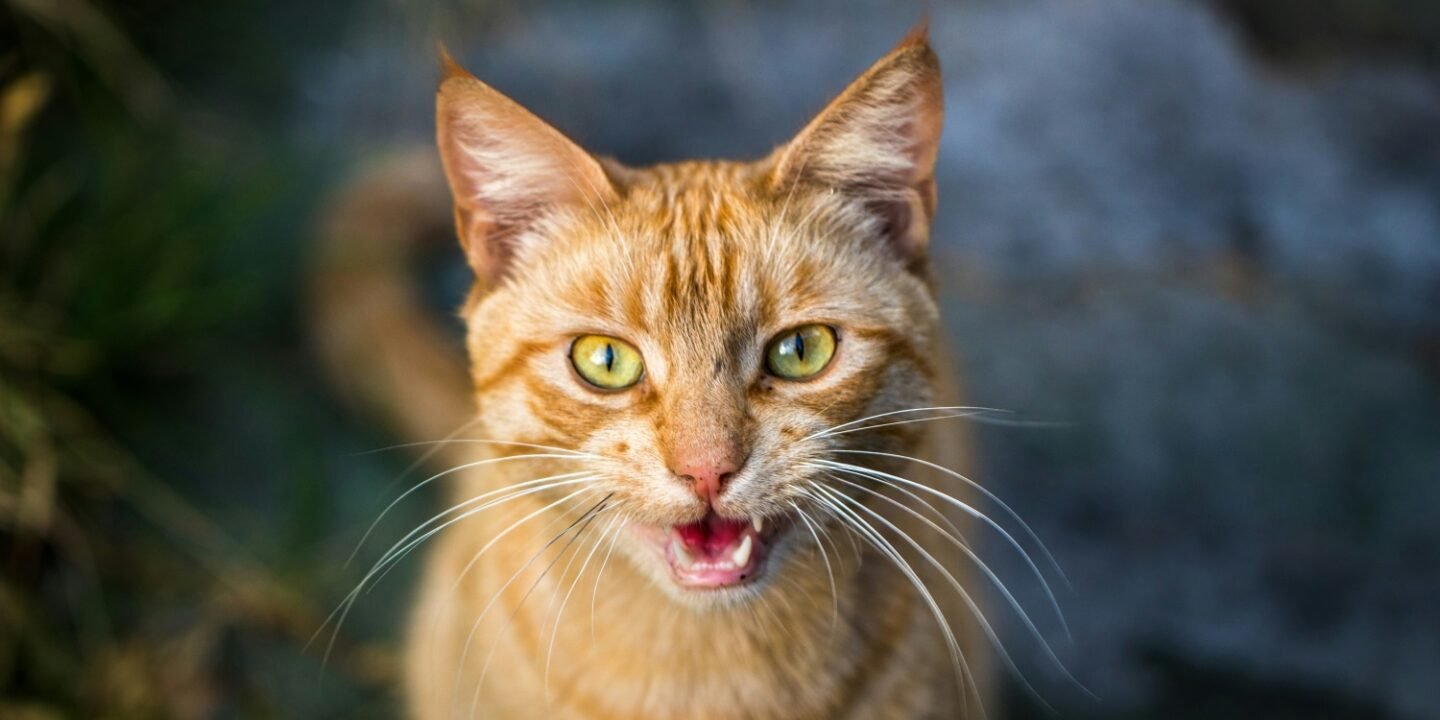You’ve finally settled into bed after a long day, the lights are out, and just as you start to drift off, meow! Then again. And again. If your cat constantly meows at night, you’re not alone. It’s one of the most common (and frustrating) issues cat owners face.
Nighttime vocalization can leave both you and your cat exhausted, confused, and a little on edge. But the good news is: there’s almost always a reason behind it—and more importantly, there are ways to fix it.
In this article, we’ll explore why your cat is meowing all night long, what it could mean about their health or environment, and what you can do to help them settle down so you both can get a peaceful night’s sleep.
Common Reasons Your Cat Constantly Meows at Night
When your cat starts meowing non-stop during the night, it’s usually their way of telling you that something is off, whether it’s physical, emotional, or environmental. Let’s explore the most common causes behind nighttime vocalizations and what they may be trying to communicate.
They’re Just Being Cats: Natural Nocturnal Behavior
Cats are crepuscular creatures, which means they’re biologically wired to be most active at dawn and dusk. While this isn’t exactly the middle of the night, their internal clock can often lead to bursts of energy when you’re trying to sleep.
This cat’s nocturnal behavior is especially noticeable in younger felines and indoor cats who may not have enough opportunities to burn off energy during the day. Their instincts to hunt, play, and interact can all kick in when the house is quiet and dark, making nighttime the perfect stage for their meows.
Hunger Strikes: Inconsistent Feeding Schedules
One of the most overlooked causes of nighttime meowing is simply hunger. If your cat’s meals are irregular or too early in the evening, they might start letting you know by meowing persistently when their stomach rumbles at midnight.
Keeping a consistent feeding schedule for cats is crucial, not just for their physical health but also to curb these hunger-related meows. Consider offering a small, protein-rich meal right before bedtime to keep them full longer. Just be careful not to reward meowing directly with food, or you might accidentally reinforce the behavior.
Medical Issues You Shouldn’t Ignore
Sometimes, excessive vocalization at night is your cat’s way of telling you that something hurts—or that something just isn’t right. Cat health issues such as arthritis, dental pain, urinary tract infections, or even hyperthyroidism in cats can cause restlessness and increased vocalization, especially in older cats.
In senior cats, nighttime meowing can also be a symptom of cognitive dysfunction syndrome (CDS), often compared to dementia in humans. They may become disoriented, anxious, or confused once the lights go out.
If your cat’s meowing is a new behavior or has recently intensified, schedule a vet visit for cat meowing as soon as possible. A professional checkup can rule out or diagnose underlying health problems that might otherwise go unnoticed.
Stress or Anxiety Is Keeping Them Awake
Just like humans, cats are sensitive to changes in their environment. Moving to a new home, the arrival of a baby or pet, loud noises, or even rearranged furniture can trigger stress in cats, and that stress often shows up as nighttime meowing.
Anxiety in cats may cause them to vocalize more frequently when the house is dark and quiet, especially if they feel unsafe or unsettled. Providing comforting routines, calming pheromone diffusers, and designated “safe spots” in your home can help reduce their nighttime anxiety.
Attention-Seeking or Loneliness
Sometimes, your cat’s midnight meows are just them saying, “Hey, are you still there?” Cats, especially those in social or single-pet households, may crave interaction during nighttime hours when you’re not available.
If you’ve accidentally responded to this attention-seeking meowing in the past—by petting, feeding, or even talking to them—you may have unknowingly encouraged the behavior. It’s important to set boundaries without ignoring your cat’s needs completely. Ensuring they receive enough affection and engagement during the day can reduce their desire to seek it at night.
Boredom and Lack of Mental Stimulation
A bored cat is a vocal cat. If your feline doesn’t have enough mental or physical activity during the day, they’re more likely to act out at night, including meowing.
Incorporating enrichment for cats into their daily routine is key. This can include puzzle feeders, window perches, climbing trees, or simply setting aside time for playtime with cats using feather wands or interactive toys. An enriched and stimulated cat during the day is more likely to rest peacefully through the night.
Litter Box Problems
Believe it or not, a dirty or poorly placed litter box can be the reason your cat won’t stop meowing at night. If your cat feels discomfort or frustration when trying to use the box, they may vocalize to get your attention or to express their displeasure.
Litter box issues can stem from several things: a soiled box, lack of privacy, incorrect litter type, or even underlying health conditions like urinary tract infections or constipation. Make sure your cat’s litter box is clean, easily accessible, and located in a quiet, low-traffic area. And if your cat seems to strain or cry during elimination, a vet check is warranted.
How to Stop Your Cat from Meowing All Night
If your cat’s nightly meowing has become a regular disruption, don’t worry—there are practical ways to reduce or even eliminate this behavior. Below are expert-backed tips you can begin applying right away to help your feline friend rest better (and let you sleep in peace).
Establish a Consistent Feeding & Play Schedule
Cats thrive on routine. One of the simplest and most effective ways to manage nighttime meowing is to stick to a consistent feeding schedule for cats. When meals are unpredictable, cats can become anxious or hungry in the middle of the night, leading them to vocalize for food.
To complement their last meal, schedule playtime with cats in the evening. A 15–20 minute interactive session with a feather wand or laser pointer mimics their natural hunting instincts and burns off excess energy. Follow this with their final meal, and they’ll be more likely to wind down and sleep through the night.
Create a Calming Nighttime Routine
Just as bedtime rituals help people sleep, cats also benefit from predictable cues that signal it’s time to rest. A calming nighttime routine might include dimming the lights, turning on soft white noise, and ensuring your cat has a comfortable, safe sleeping area.
Consider using feline pheromone diffusers, which release synthetic versions of natural calming scents that help reduce anxiety and stress. These can be especially helpful if your cat is prone to nervousness or is adjusting to a new environment.
Rule Out Underlying Medical Problems
No behavioral strategy will be effective if your cat’s meowing is caused by pain or illness. It’s essential to rule out cat health issues, especially if the vocalization is sudden, persistent, or comes from a senior cat.
A professional vet visit for cat meowing can help identify or eliminate possible medical conditions such as hyperthyroidism, arthritis, dental problems, or cognitive decline. In many cases, treating the underlying health issue leads to a dramatic improvement in nighttime behavior.
Use Interactive Toys or Enrichment Tools
Mental stimulation is just as important as physical exercise, and a lack of it can lead to boredom-induced meowing. By introducing enrichment for cats, you keep their minds engaged and satisfy their instinctual needs during the day, reducing the likelihood of nighttime restlessness.
Try adding puzzle feeders that dispense treats, cat trees for climbing and lounging, and window perches that let them observe the outside world. These simple additions can greatly improve your cat’s overall contentment and reduce unwanted vocalization.
Avoid Reinforcing the Behavior
One of the most common mistakes cat owners make is unintentionally rewarding nighttime meowing. If you get out of bed to feed, pet, or even scold your cat, they learn that meowing equals attention, exactly what they were aiming for.
To break this cycle, resist the urge to respond. It may get worse before it gets better (a phenomenon known as extinction burst), but staying consistent is key. Pair this approach with daytime engagement to ensure your cat’s emotional and physical needs are being met in healthy, structured ways.
Prevention Tips: Keeping Nighttime Meowing at Bay
Once you’ve addressed your cat’s current meowing habits, the next step is to prevent the behavior from becoming a recurring issue. Prevention isn’t just about avoiding disruptions—it’s about creating a lifestyle that supports your cat’s well-being as they grow and adapt to changes in their environment.
Adjust to Age-Related Changes
As cats age, their physical and cognitive needs evolve. If you have a senior cat, you may notice changes in behavior, such as confusion, disorientation, or increased vocalization at night, commonly known as senior cat meowing. This is often a symptom of feline cognitive dysfunction, also referred to as cat dementia.
To support aging cats, try to keep their environment consistent and easy to navigate. Nightlights can help if they get disoriented in the dark, and a predictable daily routine can reduce anxiety. Speak with your vet about potential supplements or medications that support cognitive health in older cats. Understanding and responding to these age-related changes can significantly reduce nighttime distress.
Reduce Environmental Stressors
Stress in cats is one of the most common triggers for behavioral issues, including excessive meowing at night. Whether it’s a recent move, a new pet, unfamiliar guests, or even loud construction outside, cats can become anxious when their environment feels unpredictable or unsafe.
Help lower anxiety in cats by creating secure zones throughout your home. These should be quiet spaces where your cat can retreat, equipped with cozy bedding, hiding spots, and familiar scents. Consistency in feeding, play, and sleeping routines also helps reduce stress. Additionally, consider using calming aids like pheromone sprays or diffusers to support a peaceful home environment.
Make Daytime More Stimulating
Cats that don’t receive enough engagement or stimulation during the day often end up restless at night. Providing opportunities for both mental and physical activity is crucial for maintaining a healthy sleep-wake cycle.
Offer toys that challenge your cat’s instincts, such as puzzle feeders, tunnels, and climbing shelves. Rotate toys regularly to keep things fresh. Encourage interactive playtime with cats at different times during the day, especially in the late afternoon or evening. When your cat is mentally and physically satisfied, they’re far more likely to rest quietly through the night.
When to Be Concerned About Nighttime Meowing
While it’s common for cats to meow occasionally at night, there are times when this behavior signals something more serious. As a cat owner, knowing when to be concerned can make all the difference between a quick fix and a long-term health issue going unnoticed.
Here are some red flags that suggest it’s time to schedule a vet visit for a cat meowing:
- Sudden onset of nighttime vocalization, especially in older cats.
- Excessive meowing that escalates or continues even after environmental or routine changes.
- Signs of discomfort, limping, or vocalizing when using the litter box.
- Confusion, pacing, or staring at walls may indicate cat dementia in senior cats.
- Meowing that’s paired with changes in appetite, grooming, or energy level.
These signs may point to underlying cat health issues such as hyperthyroidism, arthritis, urinary tract infections, or cognitive dysfunction syndrome. If your cat is constantly meowing at night and you’ve already ruled out behavioral triggers, a medical exam is essential.
Real-Life Case Example: Luna’s Story
To better understand how these strategies and warnings apply in real life, here’s a case shared by a fellow cat owner:
⭐️⭐️⭐️⭐️⭐️ Review by Sarah M., Portland, OR
“Our 9-year-old cat Luna started meowing loudly every night around 2–3 AM. We tried feeding her later, playing before bed, even ignoring the meows—nothing worked. We thought she was just bored, but eventually, we scheduled a vet visit. Turns out, she had early-stage hyperthyroidism.
After treatment and adjusting her schedule, Luna sleeps through the night now. I’m so glad we didn’t just write it off as ‘typical cat behavior.’ If your cat constantly meows at night, don’t ignore it—sometimes it’s their only way of asking for help.”
Conclusion
If your cat is constantly meowing at night, it’s not just a nuisance—it’s a sign that something needs attention. Whether it’s hunger, boredom, anxiety, or an underlying health issue, your cat is trying to communicate.
By understanding the root cause and applying consistent routines, enrichment, and medical checkups when needed, you can help your feline feel secure, fulfilled, and quiet during the night. Remember, your cat’s vocalizations are never random—they’re their way of saying, “Something’s off.”
With patience, the right strategies, and maybe a little help from your vet, you can restore peace to your home and ensure your cat is happy and healthy, day and night.
Frequently Asked Questions (FAQs)
Why does my cat only meow at night but not during the day?
Cats often meow more at night due to boredom, loneliness, or their natural tendency toward nighttime activity (crepuscular behavior). If your cat constantly meows at night, but is quiet during the day, it may be seeking attention or stimulation when the household is asleep.
Is it okay to ignore my cat’s nighttime meowing?
If you’ve ruled out medical or behavioral concerns, it’s okay to ignore nighttime meowing to avoid reinforcing the behavior. However, always rule out health issues and ensure your cat’s needs (food, comfort, play) are met before doing so.
Can nighttime meowing be a sign of illness?
Yes. Persistent vocalization—especially in senior cats—can point to cat health issues such as hyperthyroidism, pain, or cognitive decline. Always schedule a vet visit for cat meowing if the behavior is new, intense, or unusual.
How long does it take to stop a cat from meowing at night?
That depends on the cause. For behavioral issues like boredom or hunger, changes can work in days or weeks. For medical causes, improvement depends on treatment. Be patient and consistent with your approach.
Should I let my cat sleep in my room at night?
That depends on your preference and the cat’s behavior. Some cats sleep peacefully with their humans, while others become more active or disruptive. If your cat is constantly meowing at night, you may need to experiment with boundaries and bedtime routines.





